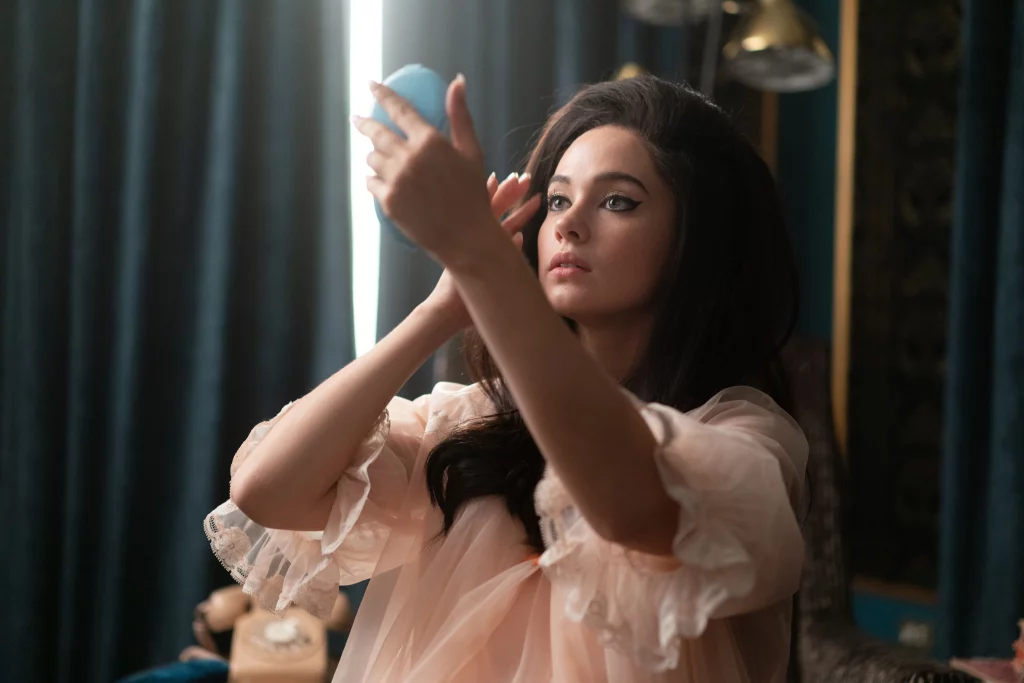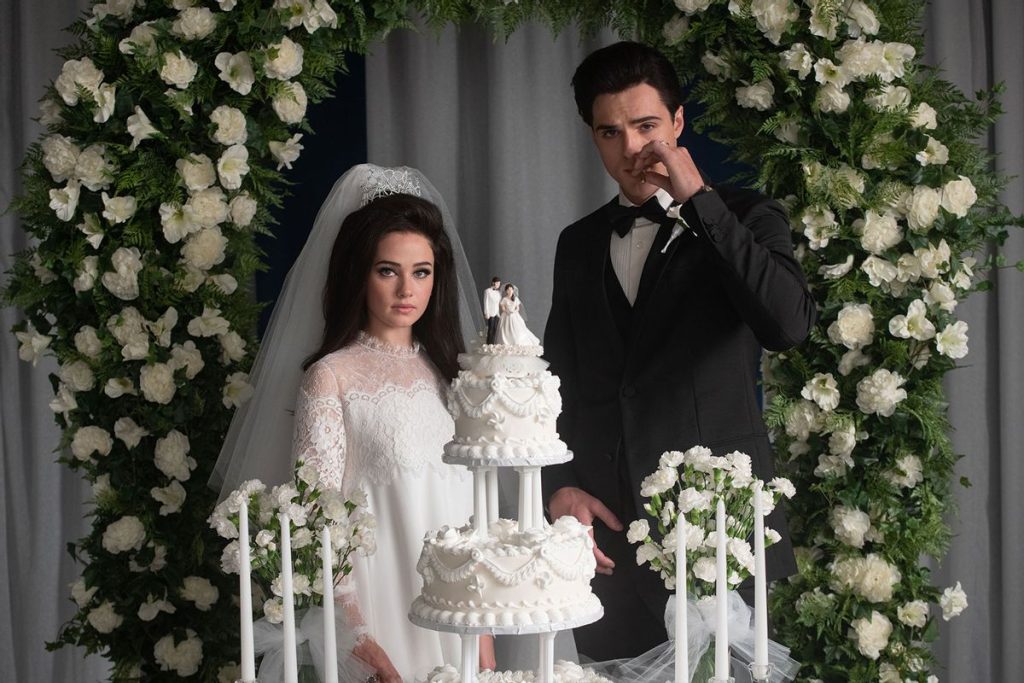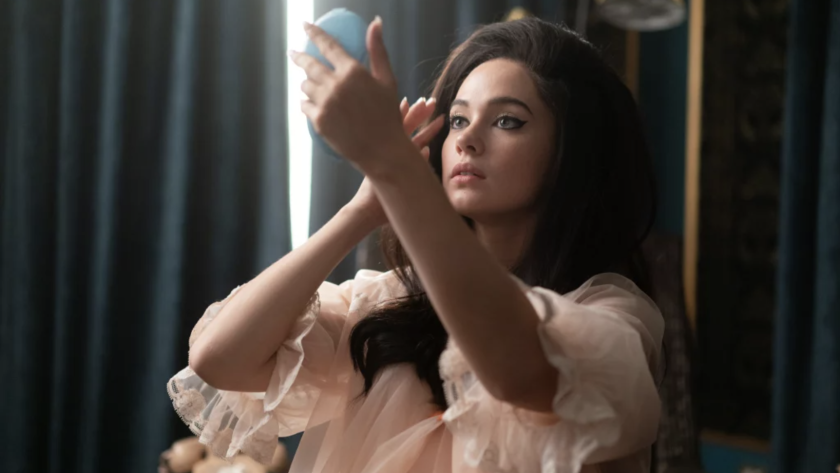
Elena Goh reviews Coppola’s ‘Priscilla’ . The film adapts Priscilla Presley’s memoir Elvis and Me, focussing on the timeline of her relationship with Elvis Presley. An atmospheric dark fairytale that utilises Coppola’s conventions to depict Priscilla’s story with utmost care and gentleness.
Sculpting the King of Pop to be a tragic hero of mythical proportions, Elvis (2022) was pure cinematic dynamite, chronicling a blazing legacy with kaleidoscopic visuals and elaborate performances by one very dedicated Austin Butler. Yet in the smoking wake of its path, Priscilla (2023) achieves the same impact through silence.
Directed by Sofia Coppola — who enjoys the same (well-deserved) cult following of Lana Del Rey and Taylor Swift for her narratives of girlhood — Priscilla (2023) is an adaptation of Priscilla Presley’s memoir Elvis and Me. The film traces her life as Elvis Presley’s wife, starting with their first encounter in Germany, her subsequent move to Graceland, their marriage, the birth of their daughter, and culminating in their eventual divorce. The entire narrative feels like a mythical retelling, presenting an alternative perspective that is uncanny yet beautiful. Priscilla is played by the incredible Cailee Spaeny, Elvis by Jacob Elordi, with Priscilla Presley herself featuring as a producer and close collaborator. As a whole, the film emerges as a stunning biopic, containing a dark yet fairy tale-like quality vaguely reminiscent of Spencer (2021).
It boasts all the ingredients of a Sofia Coppola film. A masterful use of colour, atmospheric settings, elaborate costume design and a complex, conflicted female character. An interesting detail to note is that during the New York Film Festival premiere, it’s revealed that the set design took inspiration from In the Mood for Love (2000), particularly the hotel scenes. The influence is palpable (note the curtains), and the subjective, nostalgic lens is particularly appropriate as a cinematic translation of a memoir. As a testament to the film’s meticulousness, much of the storytelling comes through the mise-en-scene and costume design. While the expectation that women in film should care more about costume design is usually tainted with misogyny, Coppola wields her expertise here with incisive power. Priscilla’s dresses don’t just represent her emotional state or, like in La La Land (2016), her growing maturity — it’s more complex than that. As her role in Elvis’s life changes, her attire represents the different roles she has to play, and the responsibilities that she is not ready for but dons with sheer will. As distinctive markers of her evolving aspirations, we watch her makeup darken, her colour palette cool down, and her innocence wither.
A significant portion of the film has Priscilla walking restlessly through empty rooms. In these scenes, Coppola uses silence in the same way that some directors would use monologues or rambling conversations about mundane objects. Apart from letting the film breathe, the quietness builds tension and allows Priscilla’s emotions to bloom across the screen in a way that feels achingly intimate. It’s part of how Coppola captures the raw intensity of girlhood, where excitement, hopelessness and determination are all portrayed in flickering expressions. In silence, Coppola casts the spotlight on female characters when they think there’s no one watching, and the effect is powerful. Instead of hampering the pace, the focus on Priscilla’s introspection grounds the story in her perspective, balancing out the colossal presence of Elvis. Notably, in a time defined partly by Elvis’s music, the soundtrack doesn’t feature any of his songs. Working in the aftermath of Elvis (2022), this distinctly different tone also helps the film to focus its gaze on the protagonist.
Cailee Spaeny is lovely. The height difference between her and Elordi is used to emphasise their characters’ age gap and heighten unease. Her expressions, precise and unerring, allow her to flesh out her character’s narrative in a way that almost reminds one of Florence Pugh. She mentions working closely with Priscilla Presley herself, and her acting does feel like a respectful tribute, so it was exciting seeing her at the Southbank Centre to introduce the film herself. Jacob Elordi, on the other hand, looks objectively less like Presley than Austin Butler, but it makes sense in the nostalgic lens of the film. Charisma slides off his skin so effortlessly, you believe that anyone would give up anything to be near him — this is not the King of Pop, but Priscilla’s Elvis, the girl fantasy of a larger-than-life persona. Yet he lends the character a sensitivity that makes the emotional scenes land. With the lingering spectre of Euphoria (2019-), he seems to have mastered the tragically gorgeous YA boy fantasy aesthetic, so I’m convinced his next casting is going to be a Greek god or an elf or some other thing that doesn’t wear a shirt (if you’d like to see more of that, you can also watch Saltburn (2023) for reasons that include but are not limited to Elordi).

In some ways, Priscilla (2023) is a tale of a girl who grew up too fast in stardom and immense privilege, like many of Coppola’s protagonists. However, the violence of that loss of innocence lingers. As a mythical retelling with critical references to its preceding biopic, Priscilla (2023) stands out as a film that is hard-hitting as it is beautiful.




